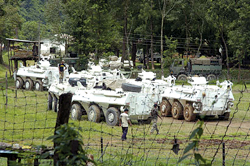|
|
Most Nepalis will welcome plans for new peace talks before Dasain, announced after the prime minister met the top two Maoists on Sunday.
That is because Nepal still hovers between war and peace. Large-scale violence has ended, but local outrages continue, mainly perpetrated by the Maoists. And despite the claims that suspicions have been lifted, mistrust between the Maoists and the government has been rising.
This enables the Maoists to disrupt life on relatively small pretexts, as illustrated by last week's incident surrounding the armoured vehicles at Gajuri military camp. After the ceasefire monitoring committee found the trucks empty, the strike was called off, but Prachanda still said there was a conspiracy.
Given this recent pattern, how will things play out in the weeks to come? Let's focus on the intentions of the Maoists and the government.
The Maoists, sporting their new grey uniform, have come largely overground, and are running a slick Kathmandu office. But as for what they'll do next, predictions are divided between the pessimists and the optimists.
Some of Prachanda's recent remarks have been hardline. For instance, his assertion that the people are asking the Maoists to keep their weapons, that the camps the Maoists are building can be seen either as a contribution to peace or as a "preparation to meet any eventuality", and that when multi-party democracy comes back to Nepal, it will only be a "transitional phase".
Baburam Bhattarai reportedly says constituent assembly elections will not be possible without restructuring the Nepal Army-whatever that means.
Some pessimists see the Maoists moving by stealth into a position of power, eulogised by most of the civil society lobby. A contributor to www.blog.com says Maoists have been entering FM stations and threatening violence unless they air the news they demand. I can only hope that isn't true.
Pessimists also point to the fact that Maoist extortion, abductions and even killings continue around the country- the most recent victims, two dalits in Lamjung, tortured to death.
The optimists counter that the Maoists' tough remarks are a way to pressurise the government to move faster and ensure that lower-level Maoist cadres are not alienated. The Maoists insist that their demands for money are a matter of feeding their army and militia. There are tens of thousands of these, some of whom have been living underground for years. What will they do next?
Optimists note that senior Maoists still say there's no going back to war. In his recent BBC phone-in, Prachanda said his repeated use of the term "October Revolution" was symbolic and might refer to the future establishment of a republic through the elected assembly.
The prime minister and some of his cabinet have also been talking tough, saying, for instance, that until the Maoists disarm, they can't become a normal political party. Many people are appalled by the idea of an armed party entering elections. But there is another uncomfortable fact-the June eight-point agreement mentions rapid movement towards interim arrangements, including the dissolution of parliament. It does not speak of any conditions for this to happen.
The Maoists have a point when they accuse the government of reneging on agreements, and they themselves have started backtracking on last month's letter to the UN, which requested help to monitor their own army's confinement in camps.
The government did, after signing the June agreement, admit that they'd not done enough "homework" earlier. On the other hand there is evidence that the rebels virtually blackmailed them into signing by threatening a return to war unless big concessions were made.
So political squabbling continues, party politicians jostle for influence, and the Maoists behave as if they own the country just because they have weapons. Into the vacuum of democratic behaviour comes uncontrolled street politics.
Pushing aside autocratic royal rule in a largely peaceful manner was an achievement, and inspiration to people around the world. But Nepal still has a long and uncertain route to travel.
Charles Haviland is a journalist for BBC television and radio for South Asia.




